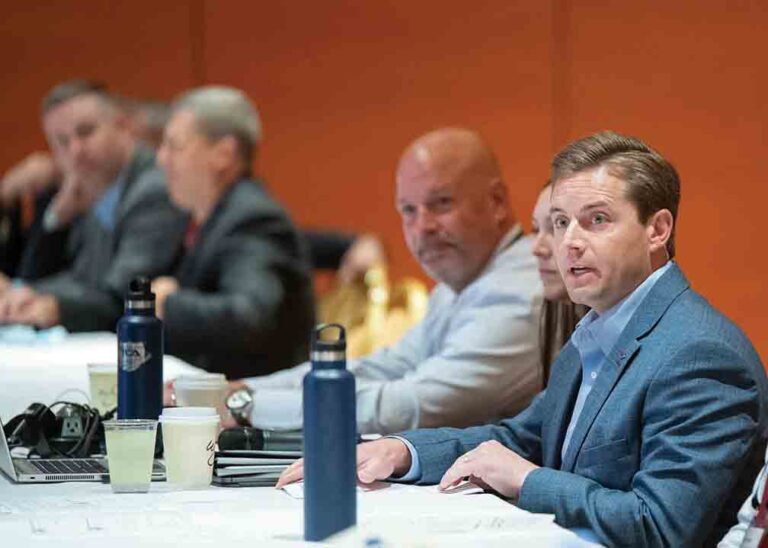Adam Blanchard
Many trucking company executives started their careers behind the wheel, learning the trucking business from the road up over many years. But this is not so with Double Diamond Trucking’s CEO Adam Blanchard.
Everything Blanchard knows about the trucking industry came after he agreed to join a buddy to co-found the company in 2014. To this day, the former attorney shakes his head over how green he was.
“I met a friend of mine through Bible study and he worked for a trucking company,” recalled Blanchard.
“He kept telling me the things he would do differently. One night we were watching baseball at a sports bar, and I said, ‘Well, why don’t we start a trucking company?’” he shared. “We started our company in my kitchen two weeks later in 2014, and we got our first truck on the road. Started with one truck and one trailer.”

You’d never guess today that the early days of Double Diamond were a crash course in trucking for Blanchard.
Over the past seven years, the company, which has expanded into freight services, has become an unqualified success story, having grown to 75 trucks, 200 trailers and almost 50 employees — not counting the owner-operators who make up the majority of on-the-road head count.
And Blanchard has grown too, from a rank outsider to a savvy logistics businessman who learned things the hard way, and fast.
“I didn’t have any background in trucking at all,” he chuckled. “I was just looking for an opportunity to get into business. And there’s not a better industry in the world to be in than trucking. The absolute salt of the earth, (the) best people I’ve ever met are my friends and colleagues in the trucking industry.”
For everything he didn’t know about trucking, there were some elements that he knew all too well — namely government encroachment, excessive taxation, and tort abuse, all of which Blanchard says have only increased with time. Having the opportunity to stand against such government overreach was one of the most appealing things about his getting involved with the Truckload Carriers Association (TCA).
“When I was growing up, my dad told me, ‘Son, to be successful you need to be involved in your community and be involved in your industry.’ I really live by that,” he said. “I’ve always believed if you have the opportunity to be in business, you need to be involved in your industry to make sure you can make a positive impact. You want to leave things better than when you received them.
“TCA is such a special organization,” he continued. “They do an incredible job advocating for our specific segment of the industry. I’m very appreciative, and very humbled by the fact that the leadership of TCA has given me the opportunity to get involved.”
Blanchard took a seat on the Highway Policy Committee and chaired the Vehicle Miles Traveled (VMT) Tax Subcommittee, which developed a guidance document for members to grasp the various taxing efforts afoot targeting the industry. The issue remains a primary focus as Blanchard has taken over as chairman of the committee.
“There has been a proliferation of electric vehicles at the same time the Highway Trust Fund is continuing to deteriorate,” he said. “So, there has been a lot of discussion at the federal level — and frankly the state levels now — about how do we make sure that electric vehicles pay their fair share? One of the policy concepts that has come out of that is creating a new taxing regime that is the vehicle mileage tax.
“We pay fuel tax every time we fill up, so what a vehicle mileage tax would do is it would tax us as an industry specifically not at the pump, but on the miles that we run,” he explained. “Recently U.S. Sen. John Cornyn, from Texas of all places, suggested that we should have a 25-cent vehicle mileage tax just on Class 7 and Class 8 vehicles.”
The effect of such a tax, Blanchard said, would be devastating to the trucking industry.
“This is an issue that is incredibly important, and (it’s) a critical issue because we, as an industry, already pay more than our fair share to the Highway Trust Fund. I think we pay 84% of the funds that go into the Highway Trust Fund through the fuel tax,” he said.
“Creating a whole taxing regime to tax us by the mile … I mean, our trucks run on average about 100,000 miles a year. At 25 cents a mile, that would be $25,000 per truck per year,” he predicted. “That is a crippling tax that would have a huge, huge impact on our industry. It’s an existential threat to us right now.”
At the same time such proposals are being made, Blanchard said lawmakers are proving tone deaf on two legislative issues that would actually help the trucking industry — driver recruitment and tort reform.
“At the top of the list of issues we’re dealing with is the driver shortage,” he said. “We have a driver shortage that’s estimated to be 80,000 drivers, if not more. Are we feeling that as an industry? Absolutely. Yet, we don’t have an opportunity to recruit people out of high school.”
Blanchard points to the DRIVE Safe Act, which would allow the trucking industry to train younger drivers for interstate routes.
“Look, just give us the opportunity and we will put somebody to train them in the cab with them. We will provide them trucks with all the safety technology out there available. Just give us an opportunity,” he said, adding that the ability to recruit students out of high school, who are not on a college track, would help reduce the driver shortage.
“To me, there is no better bipartisan issue,” he said. “We can send kids to war, and they can drive tanks and drive trucks overseas, but they come back to the U.S., and they can’t drive from Texas to Louisiana. It just doesn’t make any sense.”
Legal issues are another area of concern, said Blanchard. Tort reform has started to creep into some state statutes addressing frivolous lawsuits and excessive judgements, but progress at the federal level is well overdue.
“We seem to always be under attack by bad policy,” he added. “Look at the new infrastructure bill that was coming through the House; included within that was raising the minimum insurance from $750,000 to $2 million. Think about the effect that would have on our industry, happening at the same time that we are in an environment of lawsuit abuse where we are constantly under attack by a lot of frivolous lawsuits that we’re having to fight throughout the country.”
The result of raising insurance minimums by such a large amount could be catastrophic, exclaimed Blanchard. “I think a lot of people don’t understand that this industry is an industry of very tight margins and trying to absorb the additional cost related to that is difficult to say the least.”
In such an environment, it’s more critical than ever for all industry players to educate themselves and rally behind a strong industry advocate such as TCA, he added.
“I think TCA has done a great job of informing our membership, and I think that the members within our association are doing a good job of coordinating to ensure that we have a voice in Washington and within the states that we operate,” he said. “Like anything, we can always do better, but I think we’re doing a great job of communicating the issues that are important to us. We need to keep coming to the floor and we need to continue to make sure that our voices are heard at the state and federal level.”
*Editor’s note: This is the first in a series of articles highlighting the Truckload Carriers Association’s committees which are open for all members to join. To learn more or to sign up for a committee, visit truckload.org/committee-program-leadership.
Dwain Hebda is a freelance journalist, author, editor and storyteller in Little Rock, Arkansas. In addition to The Trucker, his work appears in more than 35 publications across multiple states each year. Hebda’s writing has been awarded by the Society of Professional Journalists and a Finalist in Best Of Arkansas rankings by AY Magazine. He is president of Ya!Mule Wordsmiths, which provides editorial services to publications and companies.











